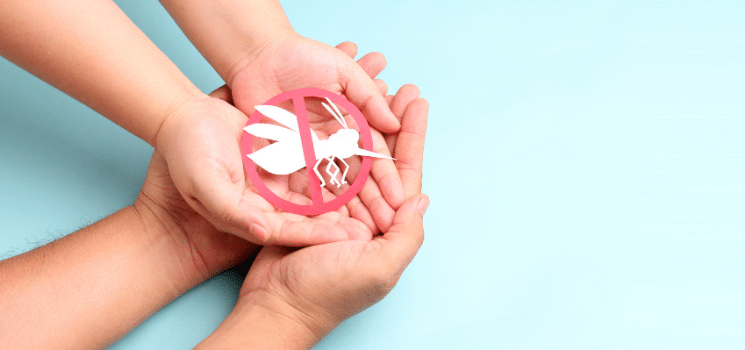Dengue in Singapore
Dengue fever has been a locally endemic virus in Singapore for many decades, with the first outbreak reported as early as 19011. Serological surveys conducted by the local Blood service groups of the Health Sciences Authority have found that the likelihood of dengue infection increases with age2, increasing from about 16% in the 16-20 age group to 86.6% in the 56-60 years age group.
Transmission of the dengue virus occurs through the bite of the female Aedes mosquito during a blood meal. In Singapore, the main driver of dengue fever is the Aedes aegypti mosquito, while the Aedes albopictus mosquito transmits a similar viral illness called Chikungunya fever.
Understanding the virus
There are four main serotypes of dengue viruses: Den-1 to Den-4. Prior to the COVID-19 pandemic, Den-2 was the predominant circulating strain. However, during the pandemic, there was a significant replacement of Den-2 by Den-3 as the predominant strain, leading to the largest dengue outbreak in Singapore in 20203. This serotype switch is a cyclical event that occurs approximately every 5 to 6 years.
Transmission in recent times
The high number of reported dengue infections may be surprising, especially among the 56-60 year-old age group who might not even recall being infected. This is because a large majority of dengue transmissions occur through asymptomatic and pre-symptomatic individuals. Up to half of those infected may not display symptoms, and even those with mild symptoms may not be diagnosed with dengue fever. The COVID-19 circuit breaker in 2020 saw a significant increase in dengue infection rates (by up to 37.2%), a finding possibly explained by the home dwelling and day-biting habits of the Aedes agypti mosquito.5
A warmer and wetter climate has also created a more favourable environment for Aedes mosquitoes to thrive and accelerate their lifecycle. In addition to the creation of new breeding grounds, warmer climates can also increase the rate of dengue replication within mosquitoes, allowing them to maintain a dengue endemicity in Singapore.
Symptoms and reinfection
The symptoms of dengue fever, including fever, muscle aches, lethargy, and poor appetite, are often similar to other viral illnesses like influenza. However, generalised rash and pinpoint rash reflecting low platelet counts are more characteristic of the disease. Severe cases can lead to bleeding, low blood pressure and multiorgan failure, resulting in approximately 10-30 deaths per year.
Reinfection with a different dengue serotype can be more severe than the initial infection due to a phenomenon known as antibody-dependent enhancement. Antibodies created from the first infection do not protect against a different serotype and can actually worsen the second infection, leading to more severe disease. Currently, there is no direct treatment for dengue fever, and severe cases are managed supportively while waiting for spontaneous recovery.
Preventing the dengue endemic
The primary focus of dengue prevention in Singapore is vector control, and individual efforts to decrease mosquito breeding sites have become a way of life here. In recent initiatives, Wolbachia infected Aedes male mosquitos were released into the wild as part of ‘Project Wolbachia’ to decrease the Aedes mosquito population. When female mosquitos mate with Wolbachia-infected Aedes male mosquitoes, they produce eggs that do not hatch. This results in a drastic decrease in the Aedes mosquito population, decreasing the number of dengue cases in areas covered by the project.
Dengvaxia the only dengue vaccine currently approved in Singapore, but it is only administered to individuals who have previously had a dengue infection. However, its protective efficacy against serotype 2, the predominant serotype in 2020, is only around 50%. According to findings from a trial conducted in Philippines and Brazil, individuals who have not been exposed to dengue prior to the vaccination may be at a higher risk of more severe dengue and hospitalisations.
An alternative dengue vaccine is currently being evaluated in Singapore, showing promising initial results in terms of efficacy and safety, with over 80% protective efficacy demonstrated after a 2-dose schedule.
In conclusion, dengue is an ongoing and locally endemic disease in Singapore due to our favourable climate. To safeguard against dengue, it is crucial that we persistently prioritise active prevention and early recognition as our primary line of defense.
- More F, 1904. Observations on dengue fever in Singapore. J Malaya Branch Br Med Assoc1: 24–29.
- Dengue Seroprevalence of Healthy Adults in Singapore: Serosurvey among Blood Donors, 2009 Am J Trop Med Hyg.2015 Jul 8; 93(1): 40–45.
- Quarterly Dengue Surveillance Data 2018-2021. National Environment Agency.
- Contributions from the silent majority dominate dengue virus transmission Quirine A. ten Bosch et al Plos Pathogens 2018
- Increased Dengue transmissions in Singapore attributable to SAR-CoV2 Social distancing measures Lim Jue Tao et al The Journal of infectious disease September 2020.






